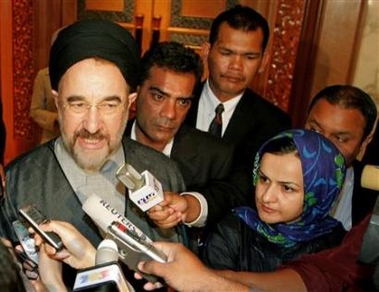|
Khatami defends Iran's nuclear plan
(Reuters)
Updated: 2006-02-11 14:40 KUALA LUMPUR (Reuters) -
Former Iranian President Mohammad Khatami defended his country's nuclear program
on Saturday and, singling out Israel, said the West should focus its pressure on
building a nuclear-free Middle East.
The United Nations' atomic watchdog, the International Atomic Energy Agency
(IAEA), voted last weekend to report Iran to the U.N. Security Council over its
nuclear program.

Former Iranian
President Mohammad Khatami speaks to members of the media as he arrives
for a conference in Kuala Lumpur February 11, 2006. [Reuters] |
|
Western powers accuse Iran of developing an atomic weapon, while Tehran
insists it aims to produce only civilian energy.
"It would have been very good if the international community, especially the
Europeans and the IAEA, would make efforts to have a nuclear-free region in the
Middle East," Khatami told reporters on the sidelines of a conference in the
Malaysian capital.
"But instead of focusing their efforts on achieving a nuclear-free Middle
East, they have focused their efforts on Iran, who only wants peaceful nuclear
technology."
Khatami, a moderate whose eight-year term ended last year, said Iran was
being unfairly targeted.
"Today, some countries in the Middle East as well as Asia have nuclear
weapons, the biggest of which is Israel," he said.
"Iran neither has nuclear weapons nor wants to develop nuclear weapons. Thus
pressure on Iran to relinquish its right to nuclear technology is an unfair and
unjust pressure."
It is widely assumed that Israel has a nuclear capability.
Bush reaffirmed last weekend that Iran's nuclear ambitions "will not be
tolerated," but Khatami played down the prospect of any military action.
"Despite the pressures that are on Iran, we are almost certain that there
will be no war against Iran," he said.
"If there is a war, it will be very difficult, very detrimental on Iran. But
it will be more detrimental for the people who take this imprudent action
against Iran.
He said the United Nations was unlikely to be able to muster enough support
to slap sanctions on Iran and warned of economic hardship if they were imposed.
"Currently, the price of each barrel of oil is $70 and this high price has
created many difficulties for the industrialized world. The first effect of a
sanction against Iran will be that this high price will even increase higher."
Khatami said he hoped the issue could be resolved through negotiations and
diplomacy.
|